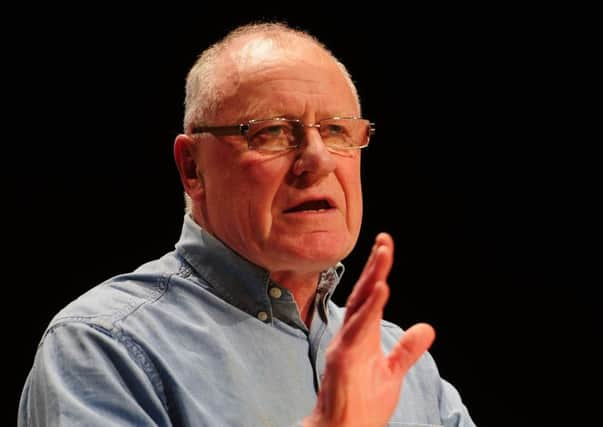Scots are ‘happy to pay extra tax’ after Yes vote


Former Labour MP Dennis Canavan said voters want to see a “fairer, sharing society” and warned that the “pooling and sharing” of resources with Westminster has failed Scotland. The Scottish Government last night said there were no plans for tax increases after a Yes vote.
But former Chancellor Alistair Darling warned that the country would face a black hole in its finances after independence and called on the SNP to be “upfront” about how it will meet the costs.
Advertisement
Hide AdAdvertisement
Hide AdThe heads of the official Yes Scotland independence campaign and the pro-UK Better Together camp appeared before MSPs at Holyrood yesterday to give evidence on the country’s economic future after independence.
Mr Canavan, the Yes Scotland chairman, told MSPs he wanted to see a “much, fairer, more progressive form of taxation”. He said: “That means for me that the rich should pay a bit more and the not-so-rich should pay less and the poor should not pay anything at all.”
The idea that the “bigger pool” of resources within the UK economy was a safety net for Scotland came under fire from the independence chief.
He said: “Better Together – the pooling and sharing of resources – hasn’t worked. It just hasn’t worked, because we have now in the UK the fourth most unequal society in the developed world.
“Whereas in Scotland, with the advantages of an independent Scottish Parliament, we would have all the economic levers at our disposal to bring about a fairer distribution of wealth. And I do think there is a will within the people of Scotland to accept a fairer, more sharing society, rather than what we have at the moment where the gap between rich and poor is getting wider.”
Conservative committee convenor Murdo Fraser MSP said the Scottish Parliament has had the power to raise income tax since 1999, but never used it.
He said: “Where’s the evidence that the people of Scotland are any more interested in voting for higher taxes than anywhere else in the UK?”
Mr Canavan told the committee the evidence was Scots voting for “left of centre” MPs and MSPs for the past half century.
Advertisement
Hide AdAdvertisement
Hide AdHe said: “A left of centre government, or a potential government of Scotland, would be more inclined to use economic levers to bring about that fairer society.”
He added: “If you look at the powers proposed in the white paper that’s certainly a huge potential for an independent Scottish Government, of whatever complexion, to bring about a radical redistribution of wealth.”
Finance secretary John Swinney has already ruled out income tax rises after independence, including any rise in oil industry taxes, offering a “competitive” tax regime for businesses, and a cut in corporation tax.
A Scottish Government spokesman last night tried to play down the idea of tax rises after independence, saying: “The process of independence itself will not change the tax rates we pay. As Scotland’s public finances are healthier than those of the UK as a whole, there will be no requirement to raise the general rate of taxation to fund existing levels of spending after independence.”
The Scottish Government insists that Scotland already contributes more per head in tax than the rest of the UK, ruling out the need for hikes.
More than half of Scots – 53 per cent – want taxes to remain at their current level, a survey undertaken by pollsters Panelbase found earlier this year.Only 17 per cent backed tax hikes, while 9 per cent said taxes should be cut.
However, a separate poll by Ipsos Mori in 2012 suggested Scots are keen to see high earners targeted for increases. It found 76 per cent either tended to agree or strongly agree that those with the highest incomes should see their taxes raised.
The SNP has indicated that Scotland could be transformed into a Scandinavian-style social democracy after independence, with strong public services such as free childcare.
Advertisement
Hide AdAdvertisement
Hide AdBut this has prompted concerns over the increased tax levels needed to fund this.
Two Scandinavian countries feature in a list of EU countries with the highest top rate of tax. A study last year by KPMG showed Sweden in first place with a rate of 56.6 per cent, followed by Denmark at 55.56 per cent, while Finland ranked fifth at 51.13 per cent. The UK tax rate at 45 per cent was in 11th place.
Yes Scotland chief executive Blair Jenkins told MSPs yesterday the difference between UK and Scandinavian tax levels is exaggerated. He added: “Nordic countries demonstrate very well that you can have strong economic growth and also a beneficial societal impact.”
But public disaffection with politics due to Westminster could be a barrier to tax increases for whichever party takes power after independence in the 2016 elections, according to Mr Jenkins.
“One of the jobs of this parliament once it becomes independent is to rebuild that sense of trust and confidence in the electorate to a point where, if a party does have a sensible and balanced set of proposals which might include an adjustment to the taxation regime, people are going to place their trust and confidence in you.”
Mr Darling then addressed MSPs, saying Scotland could survive as an independent country, but called for clarity on the impact of tax hikes.
“If you do it [become independent] then you can do it but you need to be straightforward about the consequences of what that means in terms of your tax and spend policy,” he said. “In terms of what risks you can take on and what you can’t do.”
All but one of the past 20 years has seen Scotland run a deficit, Mr Darling added.
SEE ALSO